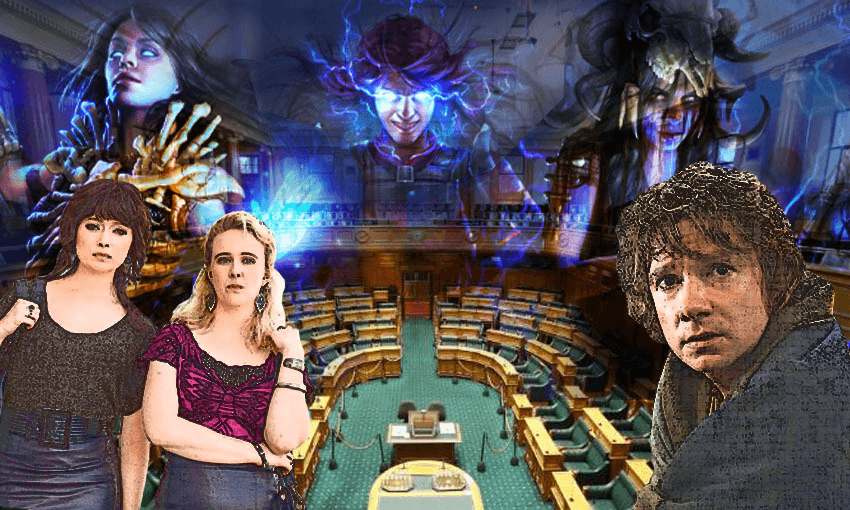A bill is currently being read in parliament that could radically shift employee rights in the screen and gaming industries. Mickey Treadwell writes on the implications of the bill.
On March 3, the innocuous sounding Screen Industry Workers Bill quietly passed its first reading. The bill, which has garnered little attention outside of game development circles, aims to “provide clarity about the employment status of people doing screen production work”. Unfortunately this “clarity” is to be achieved by forcing workers in both the film and gaming sector into contractor roles, massively reducing – if not eliminating – employee rights in the sector.
The Screen Industry Workers Bill has been a long time in the making. The particulars were devised by a Labour-appointed working group in early 2018, but it was first conceived in 2010, when the National government passed the “Employment Relations (Film Production Work) Amendment Bill” (or “the Hobbit Law”). This bill explicitly exempts workers in the film industry from claiming the rights owed to an employee, even when fulfilling the requirements to be considered an employee in any other industry.
This has effectively allowed employers to hire workers as “independent contractors” in name only, demanding the responsibilities of an employee while providing none of an employee’s benefits. The Labour party of the time opposed the bill as a cynical attack on workers’ rights and a capitulation to US film juggernaut Warner Brothers. Unions predicted, correctly, that this would be the death of the New Zealand film sector employee; now that contractors can be made to work as though they are employees with no legal recourse, there is no motivation for an employer to offer an employee contract.
Our film and television workers have since been locked into an exclusive lower class of employment. Film and television shoots are relatively short-lived affairs and, historically, short-term independent contractor agreements have served both workers and employees well – but the Hobbit Law has allowed these contracts to become almost ubiquitous. Quite apart from the competitive freelance work of production, workers in post-production, IT and finance are often maintained by a series of renewed short-term contracts, giving employers freedom to dismiss them simply by not renewing the contract.
These workers – that is to say the majority of our film and television workers – are not entitled to public holidays, paid sick leave or Kiwisaver contributions from their employers. The “Hobbit Law”, so named for the film that apparently justified these changes, leaves them little legal recourse and, as contractors, they are unable to collectively negotiate or strike.
In the run-up to the 2017 election, then Labour leader Andrew Little bemoaned the state of the industry and the exploitation that has become commonplace. In a Dunedin Town Hall meeting, to a crowd of young film and television workers, he promised that Labour would repeal the bill when it came into power – a promise that was reiterated by the Ardern-led government in the early days of 2018, and included in the “first 100 days” plan.
Instead, inexplicably, the task of rehabilitating the bill was delegated to a working group. The compromise devised by this group constitutes the Screen Industry Workers’ Bill. The bill, recognising that film and television workers are no longer receiving employee protection, grants some basic concessions to contractors. Should it pass, these workers will be allowed to collectively negotiate to improve their lot – though they will not be deigned permission to strike, severely limiting their power in these negotiations.
The screen industry working group also recommended that workers in the game development industry, in which the vast majority of workers are nine-to-five employees, be subject to the same conditions as film workers, uniting them under the “screen industry workers” category, regardless of the radically different nature of work in these sectors.
New Zealand’s game development industry is rapidly expanding. It is a huge employer offering promising careers to thousands of young creative New Zealanders. Should this bill pass, these jobs will instead become increasingly precarious. Many employers will take advantage of the opportunity to stop offering employee contracts entirely, and those who do continue to support their workers will be doing so at a financial disadvantage.
Why should these industries be treated differently from every other sector in the country? Prior to 2010, the Employment Relations Act did nothing to hinder employers from securing independent contractors, it merely provided protection against exploitation. Why too should these industries be considered so similarly by this bill? Film production may take a matter of months, but TV series hire the same teams continuously for years – and video games are regularly maintained and updated up to a decade after launch.
Should this bill pass, it will cement the position of our film and television workers as permanent contractors. It is not an olive branch from industry leaders, it is a slap in the face to those who have organised and fought to reclaim the rights afforded to any other New Zealand worker. Furthermore, it will do irreversible damage to our game development industry at a crucial time in its development. This bill is an ill-advised attack on our workers primarily for the benefit of foreign capital. For this bill to pass under the party of Labour would be a sickening irony.
Submissions on the Screen Workers Bill close on May 25.

